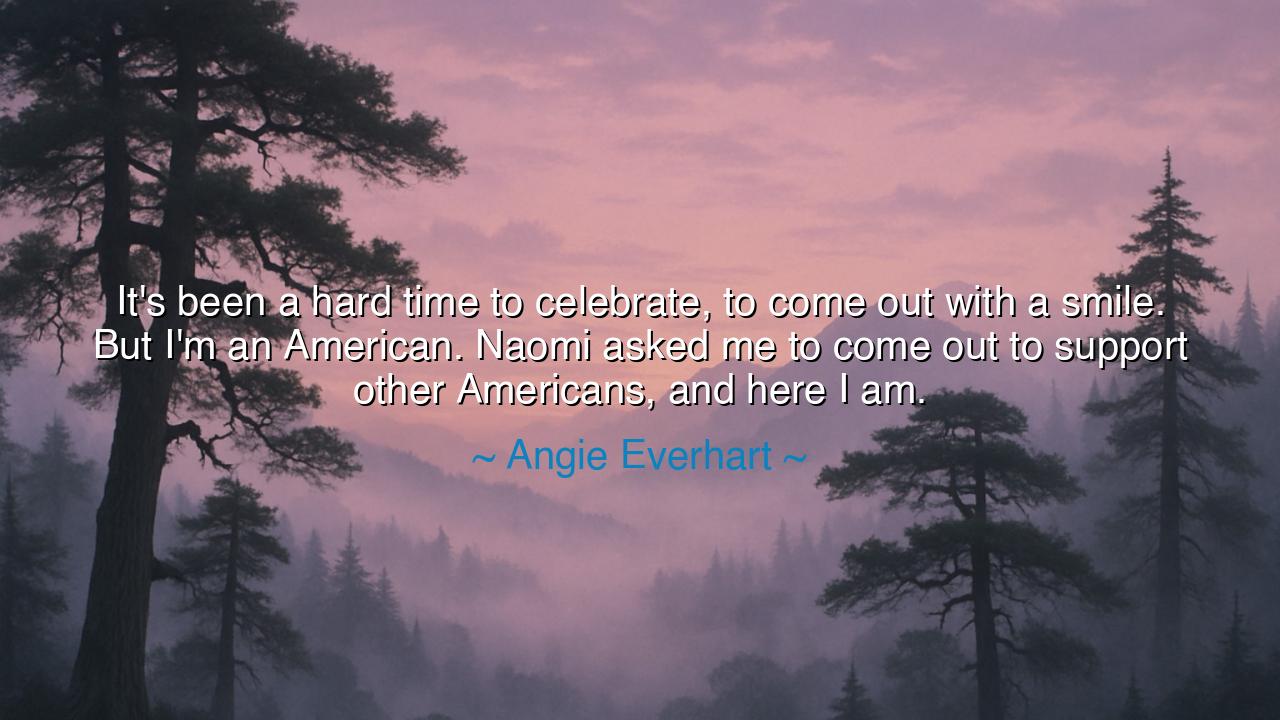
It's been a hard time to celebrate, to come out with a smile. But
It's been a hard time to celebrate, to come out with a smile. But I'm an American. Naomi asked me to come out to support other Americans, and here I am.






Hear the words of Angie Everhart: “It’s been a hard time to celebrate, to come out with a smile. But I’m an American. Naomi asked me to come out to support other Americans, and here I am.” In these words we hear the echo of grief intertwined with duty, sorrow mingled with courage. The smile, usually the emblem of joy, is here described as difficult to summon, weighed down by hardship. Yet beneath the heaviness, there is resolve: the choice to stand, to show up, to honor one’s people even when the heart resists celebration. This is not the lightness of mirth, but the deeper strength of solidarity.
The ancients understood this balance of sorrow and duty. When Athens mourned its dead after war, the people did not abandon their festivals altogether, for they believed that remembrance and celebration could coexist. The smile of such occasions was not denial of pain, but defiance against despair. So too in Everhart’s words: she acknowledges the hardship, but she still steps forward, compelled by the bonds of identity and belonging—“I’m an American.” Here, patriotism is not an abstraction; it is the anchor that steadies her in difficult times.
Consider the tale of Abraham Lincoln at the height of the Civil War. He was often described as somber, worn by the grief of a divided nation. Yet even in his darkest days, he attended gatherings, visited soldiers, and spoke words of encouragement. His presence was a living reminder that leadership is not about appearing joyful at all times, but about showing up when it matters most. The people drew strength not from his ease, but from his perseverance. In the same way, Everhart’s choice to appear in support is an act of quiet heroism—a smile, even when difficult, becomes a gift to others.
There is also humility in her words. She does not come of her own accord, seeking recognition, but because Naomi asked her. This shows another ancient truth: that community calls us forth when we cannot rely on our own will. In times of sorrow or crisis, we may lack the strength to act for ourselves, but when asked to stand for others, we find renewed resolve. To respond to such a call is to embrace the sacred duty of fellowship, to acknowledge that life is not endured alone.
The smile in this quote, then, becomes a symbol not of lightheartedness, but of resilience. To smile in easy times is natural, but to smile in hardship is an act of courage, a defiance against despair, and a gift to those around you. It is the same spirit that led Londoners to sing in shelters during the Blitz, or New Yorkers to gather and help one another after September 11th. In such moments, celebration does not erase pain—it proclaims endurance.
The lesson for us is clear: when the world is heavy and celebration feels hollow, show up anyway. Do not wait until your heart is light to give your presence, your support, your smile. Even a weary smile can lift another’s spirit; even reluctant steps into the public square can remind others they are not alone. Patriotism, loyalty, and love for one’s people are not measured by ease, but by the willingness to stand with them in difficult days.
So let this wisdom endure: do not think of the smile only as joy, but as strength. When you cannot celebrate, let your smile be defiance; when you cannot rejoice, let your presence be solidarity. For in standing together, even in hardship, we discover the heart of community—and we pass to others the flame of resilience that refuses to be extinguished.






AAdministratorAdministrator
Welcome, honored guests. Please leave a comment, we will respond soon